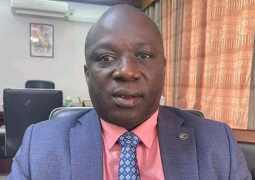
The project, “Strengthening Public Access to Information and Media Professionalism in The Gambia”, is a two-year initiative which seeks to strengthen public awareness and understanding of the Access to Information (ATI) Act, which was adopted in August 2021, thanks to the previous UNDEF project UDF-15-642-GAM, and support by other partners.
This new project (UDF-21-912-GAM) seeks to maximize the benefits of this law by promoting information requests from journalists and members of the public, information provision from the government, and the potential benefits derived from the application of the law.
It also seeks to improve media professionalism by raising awareness about the role of the Media Council of The Gambia (MCG) and by promoting journalists’ compliance with the Cherno Jallow Charter of Ethics for Journalists (the media code of ethics) reflecting the new ATI Act’s spirit and practices.
“It is our goal that this project would address barriers to access to information in the Gambia, and improve knowledge and the use of the ATI legislation by journalists and members of the public,” GPU Secretary General, Modou S. Joof said.
“Journalists and members of the public are better equipped to exercise their rights under the law, and demand the fulfilment of obligations found within the law to hold the government accountable and to promote transparency, when they are aware of the law and know how to utilise it.”
In August 2021, an Access to Information (ATI) Act was passed for the first time in Gambia’s history, thanks to the fervent advocacy by the Gambia Press Union (GPU) and a host of local and international partners.
However, the law is written in legal language not easily understood by lay members of the public and has not been fully implemented. Therefore, this present project aims to strengthen public access to information and improve media professionalism in The Gambia and has three expected outcomes:
1) awareness raised about the ATI Act 2021 within the government and amongst the general public – through the production and dissemination of the simplified versions and the translation into non-legal language and into several widely accessible local dialects - including the Gambian Sign Language, town hall meetings and workshops, radio and TV programmes, and social media.
2) implementation of the ATI Act promoted via enhancing the capacity of both the government and journalist stakeholders – by conducting training for journalists, small grants to support investigative journalism and the practice of information requests, and engagement meetings with government officials.
3) media professionalism strengthened, including the application of the ATI Act and the Media Council of The Gambia (MCG) – via the popularisation of the existing Cherno Jallow Charter of Ethics for Journalists among media workers and journalists, as well as sensitising the public, and affording them with the requisite knowledge on how to access the MCG to report breaches of the code of ethics by media workers and media houses.
“This project comes at a very crucial time to support the operationalisation of the ATI law, and it is important to empower decision -makers in government including permanent secretaries, managers of government agencies, information and record officers on their roles and responsibilities of proactively and reactively disclosing information,” GPU President Muhammed S. Bah said.
“It will also contribute to the promotion of responsible journalism and improve professionalism among media workers and journalists in the Gambia by training journalists on media ethics and creating awareness amongst members of the public to be able to hold journalists to account via our self-regulatory mechanism, the MCG.”
The project will be implemented nationally by the GPU in collaboration with various stakeholders including the Civil Society Coalition on Access to Information, the Gambia Government through the Ministry of Information, and the MCG.
Chairperson of the CSO Coalition on ATI, John Charles Njie, said: “The numerous trainings and sensitizations on the ATI law to be conducted under this project across the country will no doubt enhance public interest in access to information and the enjoyment of the right to information.”
“We are optimistic that all stakeholders will work closely for the successful implementation of this project and to ensure the full operationalisation of the ATI law. Apart from the training, this provides for more engagements with the public in the form of nationwide town hall meetings, radio and TV shows.”
Beneficiaries of the project include a range of diverse groups including journalists, government officials, women, youths, and people living with disabilities.
We commend UNDEF for the partnership and the support to this worthwhile initiative.
Read Other Articles In Headlines





